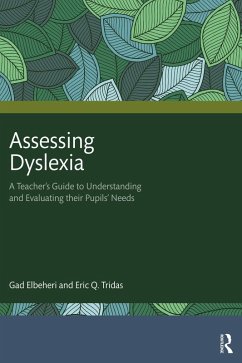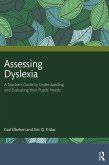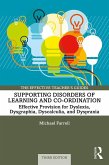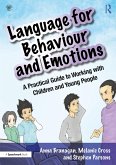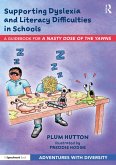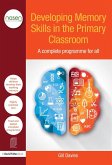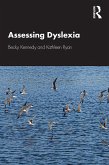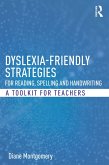Gad Elbeheri, Eric Q. Tridas
Assessing Dyslexia (eBook, ePUB)
A Teacher's Guide to Understanding and Evaluating their Pupils' Needs
29,95 €
29,95 €
inkl. MwSt.
Sofort per Download lieferbar

15 °P sammeln
29,95 €
Als Download kaufen

29,95 €
inkl. MwSt.
Sofort per Download lieferbar

15 °P sammeln
Jetzt verschenken
Alle Infos zum eBook verschenken
29,95 €
inkl. MwSt.
Sofort per Download lieferbar
Alle Infos zum eBook verschenken

15 °P sammeln
Gad Elbeheri, Eric Q. Tridas
Assessing Dyslexia (eBook, ePUB)
A Teacher's Guide to Understanding and Evaluating their Pupils' Needs
- Format: ePub
- Merkliste
- Auf die Merkliste
- Bewerten Bewerten
- Teilen
- Produkt teilen
- Produkterinnerung
- Produkterinnerung

Bitte loggen Sie sich zunächst in Ihr Kundenkonto ein oder registrieren Sie sich bei
bücher.de, um das eBook-Abo tolino select nutzen zu können.
Hier können Sie sich einloggen
Hier können Sie sich einloggen
Sie sind bereits eingeloggt. Klicken Sie auf 2. tolino select Abo, um fortzufahren.

Bitte loggen Sie sich zunächst in Ihr Kundenkonto ein oder registrieren Sie sich bei bücher.de, um das eBook-Abo tolino select nutzen zu können.
By demonstrating how to use testing to guide their teaching, this book describes the why, how, and what of assessment and promotes the self-sufficiency of teachers by providing them with a clear rationale for why particular instructional strategies should be used.
- Geräte: eReader
- ohne Kopierschutz
- eBook Hilfe
- Größe: 2.04MB
Andere Kunden interessierten sich auch für
![Assessing Dyslexia (eBook, PDF) Assessing Dyslexia (eBook, PDF)]() Gad ElbeheriAssessing Dyslexia (eBook, PDF)29,95 €
Gad ElbeheriAssessing Dyslexia (eBook, PDF)29,95 €![Supporting Disorders of Learning and Co-ordination (eBook, ePUB) Supporting Disorders of Learning and Co-ordination (eBook, ePUB)]() Michael FarrellSupporting Disorders of Learning and Co-ordination (eBook, ePUB)33,95 €
Michael FarrellSupporting Disorders of Learning and Co-ordination (eBook, ePUB)33,95 €![Language for Behaviour and Emotions (eBook, ePUB) Language for Behaviour and Emotions (eBook, ePUB)]() Anna BranaganLanguage for Behaviour and Emotions (eBook, ePUB)51,95 €
Anna BranaganLanguage for Behaviour and Emotions (eBook, ePUB)51,95 €![Supporting Dyslexia and Literacy Difficulties in Schools (eBook, ePUB) Supporting Dyslexia and Literacy Difficulties in Schools (eBook, ePUB)]() Plum HuttonSupporting Dyslexia and Literacy Difficulties in Schools (eBook, ePUB)18,95 €
Plum HuttonSupporting Dyslexia and Literacy Difficulties in Schools (eBook, ePUB)18,95 €![Developing Memory Skills in the Primary Classroom (eBook, ePUB) Developing Memory Skills in the Primary Classroom (eBook, ePUB)]() Gill DaviesDeveloping Memory Skills in the Primary Classroom (eBook, ePUB)33,95 €
Gill DaviesDeveloping Memory Skills in the Primary Classroom (eBook, ePUB)33,95 €![Assessing Dyslexia (eBook, ePUB) Assessing Dyslexia (eBook, ePUB)]() Becky KennedyAssessing Dyslexia (eBook, ePUB)42,95 €
Becky KennedyAssessing Dyslexia (eBook, ePUB)42,95 €![Dyslexia-friendly Strategies for Reading, Spelling and Handwriting (eBook, ePUB) Dyslexia-friendly Strategies for Reading, Spelling and Handwriting (eBook, ePUB)]() Diane MontgomeryDyslexia-friendly Strategies for Reading, Spelling and Handwriting (eBook, ePUB)33,95 €
Diane MontgomeryDyslexia-friendly Strategies for Reading, Spelling and Handwriting (eBook, ePUB)33,95 €-
-
-
By demonstrating how to use testing to guide their teaching, this book describes the why, how, and what of assessment and promotes the self-sufficiency of teachers by providing them with a clear rationale for why particular instructional strategies should be used.
Dieser Download kann aus rechtlichen Gründen nur mit Rechnungsadresse in A, B, BG, CY, CZ, D, DK, EW, E, FIN, F, GR, HR, H, IRL, I, LT, L, LR, M, NL, PL, P, R, S, SLO, SK ausgeliefert werden.
Produktdetails
- Produktdetails
- Verlag: Taylor & Francis eBooks
- Seitenzahl: 94
- Erscheinungstermin: 16. September 2022
- Englisch
- ISBN-13: 9781000642339
- Artikelnr.: 65002808
- Verlag: Taylor & Francis eBooks
- Seitenzahl: 94
- Erscheinungstermin: 16. September 2022
- Englisch
- ISBN-13: 9781000642339
- Artikelnr.: 65002808
- Herstellerkennzeichnung Die Herstellerinformationen sind derzeit nicht verfügbar.
Gad Elbeheri is the founder and chairman of Global Educational Consultants, Egypt. He is Director at Large of the International Dyslexia Association (IDA) and Chair of the IDA Global Partners Committee. He is also a member of the Professional Advisory Board of the Learning Disabilities Association of America (LDA).
Eric Q. Tridas is the founder and senior partner of The Tridas Group. He is an International Dyslexia Association (IDA) representative to the National Joint Committee on Learning Disabilities (NJCLD) and a member of the Professional Advisory Board of the Learning Disability Association of America (LDA).
Eric Q. Tridas is the founder and senior partner of The Tridas Group. He is an International Dyslexia Association (IDA) representative to the National Joint Committee on Learning Disabilities (NJCLD) and a member of the Professional Advisory Board of the Learning Disability Association of America (LDA).
Preface
Chapter One: The Nature of the Dyslexia Assessment
* Introduction & Definition
* Dyslexia: Prevalence & Signs
* Importance of Dyslexia Assessment
* Fundamentals of Dyslexia Assessment:
* Types of Dyslexia Assessments
* Purpose of Dyslexia Assessment
Chapter Two: The LEFT Model: A Process for Dyslexia Assessment
* Components of Dyslexia Assessment
* The Rule of Fours
* The LEFT Model
Chapter Three: Listen
* The Educational History
* Behaviour and Emotional Regulation
* Health
* Environment
Chapter Four: Evaluate - Teacher Assessment of Language & Literacy
* Checklists for Teachers
* Screening Tools for Teachers
* Error Analysis
* Progress Monitoring & RTI
* Behavioural Observations
Chapter Five: Evaluate -Understanding a Psycho-educational Evaluation
Report
* Test Types
* Interpreting Test Results
Chapter Six: Formulation: Putting it Altogether
* Formulation Structure: The Rule of Fours
* Cognitive & Processing Skills
* Academic Achievement
* Attention & Executive Functions
* Behavioural & Emotional Factors
* Health & Family Medical History Factors
* Social & Environmental Factors
Chapter Seven: Teach & Treat
* Teach
* Remediation
* The Science of Reading: Structured Literacy
* Assessment: Diagnostic Teaching
* Accommodation
* Treat
Chapter Eight: Useful Resources
References
Chapter One: The Nature of the Dyslexia Assessment
* Introduction & Definition
* Dyslexia: Prevalence & Signs
* Importance of Dyslexia Assessment
* Fundamentals of Dyslexia Assessment:
* Types of Dyslexia Assessments
* Purpose of Dyslexia Assessment
Chapter Two: The LEFT Model: A Process for Dyslexia Assessment
* Components of Dyslexia Assessment
* The Rule of Fours
* The LEFT Model
Chapter Three: Listen
* The Educational History
* Behaviour and Emotional Regulation
* Health
* Environment
Chapter Four: Evaluate - Teacher Assessment of Language & Literacy
* Checklists for Teachers
* Screening Tools for Teachers
* Error Analysis
* Progress Monitoring & RTI
* Behavioural Observations
Chapter Five: Evaluate -Understanding a Psycho-educational Evaluation
Report
* Test Types
* Interpreting Test Results
Chapter Six: Formulation: Putting it Altogether
* Formulation Structure: The Rule of Fours
* Cognitive & Processing Skills
* Academic Achievement
* Attention & Executive Functions
* Behavioural & Emotional Factors
* Health & Family Medical History Factors
* Social & Environmental Factors
Chapter Seven: Teach & Treat
* Teach
* Remediation
* The Science of Reading: Structured Literacy
* Assessment: Diagnostic Teaching
* Accommodation
* Treat
Chapter Eight: Useful Resources
References
Preface
Chapter One: The Nature of the Dyslexia Assessment
* Introduction & Definition
* Dyslexia: Prevalence & Signs
* Importance of Dyslexia Assessment
* Fundamentals of Dyslexia Assessment:
* Types of Dyslexia Assessments
* Purpose of Dyslexia Assessment
Chapter Two: The LEFT Model: A Process for Dyslexia Assessment
* Components of Dyslexia Assessment
* The Rule of Fours
* The LEFT Model
Chapter Three: Listen
* The Educational History
* Behaviour and Emotional Regulation
* Health
* Environment
Chapter Four: Evaluate - Teacher Assessment of Language & Literacy
* Checklists for Teachers
* Screening Tools for Teachers
* Error Analysis
* Progress Monitoring & RTI
* Behavioural Observations
Chapter Five: Evaluate -Understanding a Psycho-educational Evaluation
Report
* Test Types
* Interpreting Test Results
Chapter Six: Formulation: Putting it Altogether
* Formulation Structure: The Rule of Fours
* Cognitive & Processing Skills
* Academic Achievement
* Attention & Executive Functions
* Behavioural & Emotional Factors
* Health & Family Medical History Factors
* Social & Environmental Factors
Chapter Seven: Teach & Treat
* Teach
* Remediation
* The Science of Reading: Structured Literacy
* Assessment: Diagnostic Teaching
* Accommodation
* Treat
Chapter Eight: Useful Resources
References
Chapter One: The Nature of the Dyslexia Assessment
* Introduction & Definition
* Dyslexia: Prevalence & Signs
* Importance of Dyslexia Assessment
* Fundamentals of Dyslexia Assessment:
* Types of Dyslexia Assessments
* Purpose of Dyslexia Assessment
Chapter Two: The LEFT Model: A Process for Dyslexia Assessment
* Components of Dyslexia Assessment
* The Rule of Fours
* The LEFT Model
Chapter Three: Listen
* The Educational History
* Behaviour and Emotional Regulation
* Health
* Environment
Chapter Four: Evaluate - Teacher Assessment of Language & Literacy
* Checklists for Teachers
* Screening Tools for Teachers
* Error Analysis
* Progress Monitoring & RTI
* Behavioural Observations
Chapter Five: Evaluate -Understanding a Psycho-educational Evaluation
Report
* Test Types
* Interpreting Test Results
Chapter Six: Formulation: Putting it Altogether
* Formulation Structure: The Rule of Fours
* Cognitive & Processing Skills
* Academic Achievement
* Attention & Executive Functions
* Behavioural & Emotional Factors
* Health & Family Medical History Factors
* Social & Environmental Factors
Chapter Seven: Teach & Treat
* Teach
* Remediation
* The Science of Reading: Structured Literacy
* Assessment: Diagnostic Teaching
* Accommodation
* Treat
Chapter Eight: Useful Resources
References
